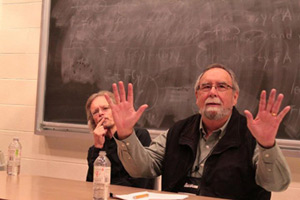Terry Cook eulogy delivered by Harris


Terry Cook and Verne Harris at the 2013 iSchool Graduate Student Conference at the University of Toronto
PHOTO: MARI VIHURI
Terry Cook, the profoundly influential archival theorist, died of pancreatic cancer on 12 May 2014 in Ottawa, Canada. Born in 1946, Cook earned his Bachelor's degree from the University of Alberta in 1969, his Master's from Carleton University in 1970, and his PhD from Queen's University in 1977.
Working for the National Archives of Canada for many years, Cook established himself as a highly respected scholar doing important work in theorising archival appraisal, particularly macro-appraisal. He urged archivists to examine their agency and influence in the shaping of the historical record, and motivated for greater transparency in this regard.
He became a professor in the Archival Studies Program at the University of Manitoba in 1998, and was named a Fellow of the Society of American Archivists and a Fellow of the Association of Canadian Archivists in 2009. In 2010, he was the first person to be elected to the Royal Society of Canada in recognition of his contributions to archival science.
Archive and Public Culture research associate and director of research for the Nelson Mandela Foundation, Verne Harris, had this to say as part of a moving eulogy to Cook, delivered at the funeral:
'We have had many profound and influential voices in international archival discourses in the last three decades. Some of them are here today. But in my estimation, Terry is the voice of his generation. Certainly in the English language - sought after, celebrated, honoured, cited, translated... But, more importantly, able to accommodate and synthesize divergent currents. He was hospitable - in his thinking, in his character. He heard and gave space to those who hold archive as a sphere of craft and technique; equally to those who experience archive as an arena of politics and power; to those who cherish the textures and the smells of artefacts; to those who roam in virtual realms; to those who find evidence; to those who listen for story. He heard the call of justice; he heard the call of profession. He was in many ways a child of the Enlightenment, an archon of illumination. But he was also a master of shadow, a poet, as ready to quote Bob Dylan or Bruce Springsteen as Bearman or Brothman. Open in a fundamental way to what some call postmodernisms...
'Terry wasn't your common or garden superstar - the kind who thrive on rubbing shoulders with other superstars, who demand VIP treatment, and who have no time for non-VIPs. The reason Terry was loved wherever he went, I would argue, is that he cared about those he encountered, listened to everyone no matter their station, and thrived on engagement, especially with young people. This was the measure of the man.'